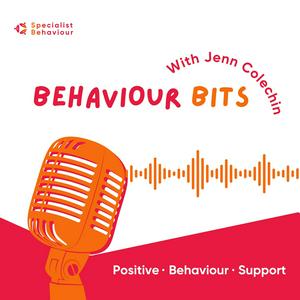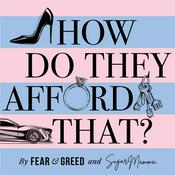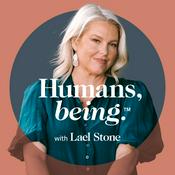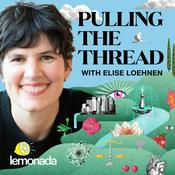17 episodes

017 All About Supervision (Kristin Bayley)
04/01/2026 | 1h 4 mins.
Sharpen your PBS skills at the 2026 Positive Behaviour Support Implementation SeminarSix powerful sessions, 6 CEUs, and real-world strategies to elevate your practice.Join us in Preston or online.Spots are limited!Register here 👉 https://pbsimplementationseminar.eventbrite.com.au/In this episode of Behaviour Bits, Jenn Colechin is joined again by behaviour support practitioner, Board Certified Behaviour Analyst, speech pathologist, and co-director of Launch Supervision, Kristin Bayley, for a deep dive into supervision.Together they unpack what “good supervision” really looks like in Positive Behaviour Support, both within NDIS contexts and beyond, and why it matters at every stage of your career.They explore the difference between clinical and organisational supervision, how to balance KPIs with genuine clinical growth, and why the “dose” and quality of supervision can be a major protective factor against practitioner burnout.You’ll also hear practical guidance on individual vs group and clinical vs organisational supervision, how to find a supervisor who’s a good fit for your values, and how supervision can help you hold onto your “why” in this demanding but rewarding work.Takeaways:Supervision should be lifelong: even very experienced practitioners benefit from a reflective space, a soundboard, and someone to challenge and extend their thinking.There is a crucial difference between organisational supervision (KPIs, billables, deadlines, compliance) and clinical supervision (case formulation, evidence base, skills, wellbeing) and both are needed.When supervision time is often consumed by compliance issues, practitioners lose opportunities for deeper clinical reflection and skill-building, and risk practising in a reactive way.Finding a supervisor starts with knowing your own “why” and values—then seeking out practitioners whose public work resonates, connecting through communities of practice, and treating the match a bit like dating: fit matters.Supervision is a key protection against practitioner burnout in emotionally demanding work; connection, celebration of small wins, and peer/reading groups all help you keep giving people the best of you, not just what’s left of you.Looking for practical, flexible learning that goes beyond the podcast?The All Access Pass gives you unlimited entry to all of our self-paced online courses, early access to new content, exclusive member discounts, and our ever-growing library of downloadable resources, templates, and clinical tools.It’s all grounded in evidence-based, person-centred practice—designed to support you at your own pace, in real-world ways.Visit https://specialistbehaviour.com/all-access-pass/Questions, comments, feedback?Email us at [email protected]

016 Navigating Positive Behaviour Support in Education (Russ Fox)
30/11/2025 | 53 mins.
Sharpen your PBS skills at the 2026 Positive Behaviour Support Implementation Seminar:Six powerful sessions, 6 CEUs, and real-world strategies to elevate your practice.Join us in Preston or online. Spots are limited!Register here 👉 https://pbsimplementationseminar.eventbrite.com.au/In today’s engaging conversation, Dr. Russ Fox discusses his journey in education, focusing on positive behaviour support and its implementation in schools.He emphasises the importance of multi-tiered systems of support, building relationships with students, and the need for targeted training for teachers.Dr. Fox highlights the interconnectedness of academic and social behaviours and advocates for a rights-based approach to behaviour support.The discussion also covers practical strategies for effective classroom management and the significance of celebrating small successes to motivate both teachers and students.Takeaways:Dr. Russ Fox emphasises the importance of effective implementation in positive behaviour support.Multi-tiered systems of support are crucial for addressing diverse student needs.Building relationships with students is essential for effective teaching and behaviour management.Teachers often feel overwhelmed by the demands of classroom management and behaviour support.Positive behaviour support should be a team effort involving the entire school community.Teachers need targeted training in behaviour management strategies during their preparation.Academic and social behaviours are interconnected and should be taught together.Implementation of behaviour support strategies must be functional and sustainable.Celebrating small successes can motivate both teachers and students.Research on rights-based approaches to behaviour support is emerging and important.Looking for practical, flexible learning that goes beyond the podcast?The All Access Pass gives you unlimited entry to all of our self-paced online courses, early access to new content, exclusive member discounts, and our ever-growing library of downloadable resources, templates, and clinical tools.It’s all grounded in evidence-based, person-centred practice—designed to support you at your own pace, in real-world ways.Visit https://specialistbehaviour.com/all-access-pass/Questions, comments, feedback?Email us at [email protected]

015 A Constructional Approach to Positive Behaviour Support
02/11/2025 | 1h
Join us for the Positive Behaviour Support Implementation Seminar — a full-day, practical program co-hosted by Specialist Behaviour and the Complex Behaviour Community of Practice. Across six focused 1-hour sessions, experienced PBS practitioners share how to implement and monitor effective strategies, collaborate across settings, and build genuine, supportive relationships.When: Fri 13 Feb 2026, 9:00am–4:30pmWhere: Novotel, Preston (215 Bell St, VIC) + livestream (no recording)CPD: Earn 6 CEUs or a Certificate of Attendance.Seats are limited. Register nowThis episode dives straight into the constructional approach to positive behaviour support (PBS), an outcomes-first, person-led framework championed by guests John Wooderson and Oliver Roschke.Rather than shrinking “problem behaviour”, they emphasise building repertoires, opportunities and genuine options using four guiding questions: where the person wants to go, where they are now, how to get there, and what will keep them going.You’ll hear how this shifts practice towards true therapeutic contracts with the individual, assent-based, strengths-focused planning, and dignified risk—grounding change in what matters to the person, not in compliance for others.We get practical about disentangling PBS from restrictive practices by targeting the behaviour of the implementing provider and co-designing alternatives that keep everyone safe without eroding rights. John shares a compelling case example replacing a compulsory in-car harness with communication supports and staged fading—resolving conflict and maintaining safety by building skills and staff practices, not adding restraint.The conversation closes with actionable takeaways: co-created “lifestyle plans” over behaviour plans, rigorous progress reviews that treat programme design (not the person) as the problem when change stalls, and a relentless focus on quality-of-life outcomes.Resources:"Nonlinear Contingency Analysis: Going Beyond Cognition and Behavior in Clinical Practice" is probably one of the most accessible introductions to the constructional approach and non-linear contingency analysis, and it was written to introduce these ideas and concepts to a broader audience, beyond behaviour analysis: https://www.amazon.com.au/Nonlinear-Contingency-Analysis-Cognition-Behavior-ebook/dp/B09GFMZ6F9/ref=tmm_kin_swatch_0 PDF copies of the book are available via most uni libraries.Constructional Approach community website: The Constructional Approach to Behavior Analysis – constructional approachRelevant research papersLiden, T.A., Rosales-Ruiz, J. Constructional Parent Coaching: A Collaborative Approach to Improve the Lives of Parents of Children with Autism. Behav Analysis Practice 18, 109–126 (2025). https://doi.org/10.1007/s40617-024-00944-y (attached)Abdel-Jalil, A., Linnehan, A.M., Yeich, R. et al. Can There Be Compassion without Assent? A Nonlinear Constructional Approach. Behav Analysis Practice (2023). https://doi.org/10.1007/s40617-023-00850-9 (free download: (PDF) Can There Be Compassion without Assent? A Nonlinear Constructional Approach)Layng, T. V. J., & Abdel‐Jalil, A. (2022). Toward a constructional exposure therapy. Advances in Cognitive Therapy, Fall, 8–11. (Free download: (PDF) TOWARD A CONSTRUCTIONAL EXPOSURE THERAPY)Linnehan, A.M., Abdel-Jalil, A., Klick, S. et al. Foundations of Preemptive Compassion: A Behavioral Concept Analysis of Compulsion, Consent, and Assent.Behav Analysis Practice (2023). https://doi.org/10.1007/s40617-023-00890-1 (Free download: (PDF) Foundations of Preemptive Compassion: A Behavioral Concept Analysis of Compulsion, Consent, and Assent)Scallan, C.M., Rosales-Ruiz, J. The Constructional Approach: A Compassionate Approach to Behavior Change. Behav Analysis Practice (2023). Https://doi.org/10.1007/s40617-023-00811-2 (free online copy: The Constructional Approach: A Compassionate Approach to Behavior Change)Layng T. V. (2009). The search for an effective clinical behavior analysis: the nonlinear thinking of Israel goldiamond. The Behavior analyst, 32(1), 163–184. https://doi.org/10.1007/BF03392181Goldiamond, I. Toward a Constructional Approach to Social Problems: Ethical and Constitutional Issues Raised by Applied Behavior Analysis. Behav. Soc. Iss. 11, 108–197 (2002). https://doi.org/10.5210/bsi.v11i2.92Looking for practical, flexible learning that goes beyond the podcast?The All Access Pass gives you unlimited entry to all of our self-paced online courses, early access to new content, exclusive member discounts, and our ever-growing library of downloadable resources, templates, and clinical tools.It’s all grounded in evidence-based, person-centred practice—designed to support you at your own pace, in real-world ways.Visit https://specialistbehaviour.com/all-access-pass/Questions, comments, feedback? Email us at [email protected]

014 Multi-Element Behaviour Support (Matthew Spicer)
30/09/2025 | 54 mins.
In this episode, Psychologist and Director of Clinical Training, Matthew Spicer explains the Multi Element Behaviour Support (MEBS) model. MEBS is a way of thinking about behaviour support that goes beyond simply trying to “stop” challenging behaviour. Instead of focusing only on what happens before and after an action, Matthew shows how MEBS emphasises needing to understand the bigger picture—the person’s past experiences, what they are trying to achieve, and how their environment supports or blocks them.He describes how behaviour support can be about improving someone’s quality of life, not just preventing problem behaviour, and that prioritising proactive strategies (what we do every day to set someone up for success) from reactive strategies (what we do in the moment to keep everyone safe) makes all the difference.Using real-life examples, he shows why sometimes the most respectful and effective response in the moment is to meet the person’s need—like offering that cup of coffee—while planning long-term skill-building and supports for the future.Matthew shares a guide for doing MEBS well. He talks about how to start with a good assessment, design plans that build skills and positive experiences, and make sure the people putting the plan into action feel supported, trained, and confident. He links this approach to broader ideas like trauma-informed practice and positive psychology, but always brings it back to what really matters: helping people have better, safer, meaningful lives.His message is clear—good behaviour support is not about controlling behaviour, but about building an environment where people can thrive.Looking for practical, flexible learning that goes beyond the podcast?The All-Access Pass gives you unlimited entry to all of our self-paced online courses, early access to new content, exclusive member discounts, and our ever-growing library of downloadable resources, templates, and clinical tools.It’s all grounded in evidence-based, person-centred practice—designed to support you at your own pace, in real-world ways.Visit https://specialistbehaviour.com/all-access-pass/Questions, comments, feedback? Email us at [email protected]

013 Reframing Sexualised Behaviour with Sarah McCluskey
02/09/2025 | 52 mins.
In this thought-provoking episode, Board Certified Behaviour Analyst, consultant psychologist, and Director of Billy Cart Behaviour Sarah McCluskey joins the discussion to unpack the complex and often misunderstood topic of sexualised behaviour.Together, they challenge common assumptions, explore why context matters, and reframe how these behaviours are described and responded to- especially when disability is part of the picture.Sarah sheds light on the concept of “counterfeit deviance”, where behaviours that appear problematic may stem from lack of education, privacy, or opportunity rather than harmful intent.She also shares practical ways to support healthy, respectful relationships and sexual expression, while reducing risk and protecting dignity.From teaching correct anatomical language as a safeguarding measure, to using structured frameworks to understand the unmet need of the behaviour, Sarah offers strategies for support that are grounded in evidence and compassion.This conversation highlights why labelling behaviours as “sexualised” can be misleading and harmful, and why skill-building, environmental adjustments, and open, values-aware conversations are critical. It’s an essential listen for anyone wanting to replace discomfort and stigma with informed, person-centred support, ensuring people’s needs for intimacy, connection, and safety are understood and respected.Looking for practical, flexible learning that goes beyond the podcast? The All Access Pass gives you unlimited entry to all of our self-paced online courses, early access to new content, exclusive member discounts, and our ever-growing library of downloadable resources, templates, and clinical tools.It’s all grounded in evidence-based, person-centred practice, designed to support you at your own pace, in real-world ways.Visit https://specialistbehaviour.com/all-access-pass/Questions, comments, feedback? Email us at [email protected]
More Education podcasts
Trending Education podcasts
About Behaviour Bits
Listen to Behaviour Bits, SOLVED with Mark Manson and many other podcasts from around the world with the radio.net app

Get the free radio.net app
- Stations and podcasts to bookmark
- Stream via Wi-Fi or Bluetooth
- Supports Carplay & Android Auto
- Many other app features
Get the free radio.net app
- Stations and podcasts to bookmark
- Stream via Wi-Fi or Bluetooth
- Supports Carplay & Android Auto
- Many other app features


Behaviour Bits
download the app,
start listening.



































